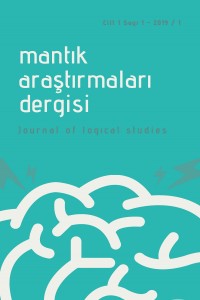Abstract
Bu makalede, Goldziher’in son dönem literatürde oldukça yankı
bulmuş olan on üçüncü ve on dördüncü yüzyıldan itibaren Sünnî Müslüman
âlimlerin git gide mantık gibi aklî ilimlere düşman oldukları yönündeki
görüşünü tartışacak; altıncı, yedinci ve sekizinci yüzyıldaki fetvalar ve
tartışmalar üzerinden bu görüşün ne kadar yanlış olduğunu ortaya koymaya
çalışacağım. Mağrib, Mısır ve Türkiye’deki âlimler arasındaki yaygın kanaat,
mantık ilminin caiz olmasının da ötesinde mantıkla ilgilenmenin müstehap, hatta
farz-i kifâye olduğu yönündeydi. Her ne kadar o dönemde, Kâdızâdeliller gibi
aykırı sesler bulunsa da on dokuzuncu ve yirminci yüzyıllarda Selefîyye
akımının ortaya çıkışına kadar Sünnî âlimler arasında ana akım bu gibi
görünmektedir.
Keywords
References
- Khaled Rouayheb, Sunni Muslim Scholars on the Status of Logic 1500-1800, Islamic Law and Society, Vol. 11, No. 2 (2004), pp. 213-232.
Abstract
In the present article, I discuss Goldziher's contention
(echoed in more recent literature) that from the thirteenth and fourteenth
centuries, Sunni Muslim scholars ('ulama') became increasingly hostile to
rational sciences such as logic. On the basis of discussions andfatawa by Sunni
scholars in the sixteenth, seventeenth and eighteenth centuries, I show that
this idea is radically mistaken. Mainstream scholars in the Maghrib, Egypt and
Turkey considered logic to be not only permissible but actually commendable or
even a religious duty incumbent on the Muslim community as a whole (i.e. a fard
kifayah). Though there were dissenting voices in the period, such as the
Qadizadelis, this seems to have been the mainstream opinion of Sunni scholars
until the rise of the Salafiyyah movement in the nineteenth and twentieth centuries.
Keywords
References
- Khaled Rouayheb, Sunni Muslim Scholars on the Status of Logic 1500-1800, Islamic Law and Society, Vol. 11, No. 2 (2004), pp. 213-232.
Details
| Primary Language | Turkish |
|---|---|
| Subjects | Logic |
| Journal Section | Translated Articles |
| Authors | |
| Translators |
Sacide Ataş This is me |
| Publication Date | July 1, 2019 |
| Submission Date | May 13, 2019 |
| Acceptance Date | June 21, 2019 |
| Published in Issue | Year 2019 Volume: 1 Issue: 1 |

